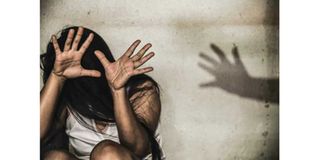Report: Most Rwandan women support wife beating

GBV victim.
What you need to know:
- Despite the findings, Rwanda is ranked among the 10 most gender-equal societies in the world at the seventh position.
- According to the 2021 Global Gender Gap Report by the World Economic Forum, Namibia and Rwanda are the only countries in sub-Saharan Africa that are fast moving towards gender equality.
The revelation of a survey that most Rwandan women are comfortable being beaten by their husbands under certain circumstances has sparked widespread uproar in human rights advocacy circles.
Rwanda’s Gender Minister Jeannette Bayisenge last week lifted the lid off the state of gender-based violence (GBV) while addressing the country’s parliament. She said GBV war is far from being won if the survey findings are anything to go by.
“You know how long we have been teaching about gender equality, this is where we are today. I want to show you that the battle we are fighting is not as easy as we might think. Mindset does not change overnight, which hinders our many strategies,” Ms Bayisenge was quoted by local media as saying.
She noted that in response, Rwanda plans to employ new and more strategies to overturn the shocking mindset. The minister termed the finding alarming and a clear indication that the country has a great deal of work to do.
'Justifications'
According to Rwanda’s 2019-20 Demographic and Health Survey Report, 65 per cent of surveyed women and 39 per cent of men said wife beating is justified under certain circumstances such as when women burn food, argue with their husbands, go out without notice, neglect children, refuse to have sex with their husbands, have extramarital affairs, or check their husband’s phone.
The report adds that 37 per cent of women and 30 per cent of men have experienced physical violence since turning 15. It also found that 16 per cent of women and nine per cent of men had experienced physical violence in the last 12 months before the survey.
The most common perpetrators of physical violence against ever-married women are their husbands/partners at 60 per cent and exes at 27 per cent. Under the never-married category, the most common perpetrators are mothers or stepmothers at 42 per cent and teachers at 23 per cent.
Sexual violence
When it comes to sexual violence, about one in four women (23 per cent) and six per cent of men have been victims. Women who are divorced, separated or widowed, the report found, are more likely to have experienced sexual violence (42 per cent) than those who have never married (19 per cent) and those married (22 per cent).
Eight per cent of women had experienced sexual violence in the last 12 months before the survey, with six per cent of women who have been pregnant revealing to have experienced violence during pregnancy.
About 46 per cent of ever-married women aged 15-49 have experienced spousal violence—physical, sexual, or emotional—compared to 18 per cent of men in the same age bracket. The most common form of spousal violence among ever-married women was physical at 36 per cent, with the most common among ever-married men being emotional at 17 per cent.
The report also shows that experience of spousal violence drops as education increases. About 54 per cent of women and 24 per cent of men with no education have experienced spousal violence, compared to 19 per cent of women and six per cent of men with more than secondary-level education.
Country's good standing
However, despite the findings, Rwanda is ranked among the 10 most gender-equal societies in the world.
According to the 2021 Global Gender Gap Report by the World Economic Forum, Namibia and Rwanda are the only countries in sub-Saharan Africa that are fast moving towards attaining gender equality. They are ranked sixth and seventh respectively.
Namibia made a significant move up from being ranked 12th in the Global Gender Index 2020 to the sixth spot in the latest report, while Rwanda moved up from ninth place to seventh. According to the 2021 report, Namibia has closed 80.9 per cent of the gender gap, and Rwanda 80.5 per cent.
The Global Gender Gap Report was first introduced by the World Economic Forum in 2006 as a framework for capturing the difference between women and men as reflected in social, political, intellectual, cultural, or economic attainments. Countries are ranked based on the degree of women's participation in the economy, their educational achievements, health and political involvement.





